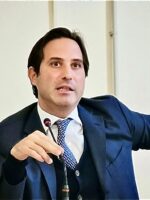
Corrado Caruso is associate professor of Constitutional Law at the University of Bologna, where he graduated in 2007 with full marks cum laude. In 2010 (spring semester), he was visiting researcher at the Yale Law School, where he sharpened his studies on First Amendment and freedom of speech. In 2011 he earned his PhD in Constitutional law from the University of Bologna with a dissertation on “Constitutional adjudications and freedom of speech in Italy and in the USA”. From 2011 to 2014 he was a postdoctoral fellow at the University of Bologna and from 2014 to 2016 he was a postdoctoral fellow at the University of Milan. Assistant Professor at the University of Bologna from 2016 to 2019, he was appointed associate professor in 2019. In 2020 he earned the National Scientific Qualification to serve as full professor of Constitutional Law.
He clerked for the Italian Constitutional Court from 2017 to 2021 (Justice Augusto Barbera).
He is currently member of the board of the Italian Association of Constitutional Lawyers and Vice President of the Council for Statutory Guarantee of the Emilia-Romagna Region (advisory institution in charge to guarantee the Italian Constitution and the Emilia-Romagna Regional Fundamental Chart – “so called: Statuto regionale” – against their violations brought by the regional law proposals).
He developed national and international experience, working on international projects at the University of Bologna and Milan. He authored or coauthored about eighty academic publications including seven books (two monographs) on freedom of speech, judicial review of legislation, national and European federalizing process, multilevel constitutionalism, constitutional theory, financial provisions of the constitution. His current main research interests are focused on freedom of speech in digital environments and the constitutional design of the majority principle.
Contact: cc8114@nyu.edu